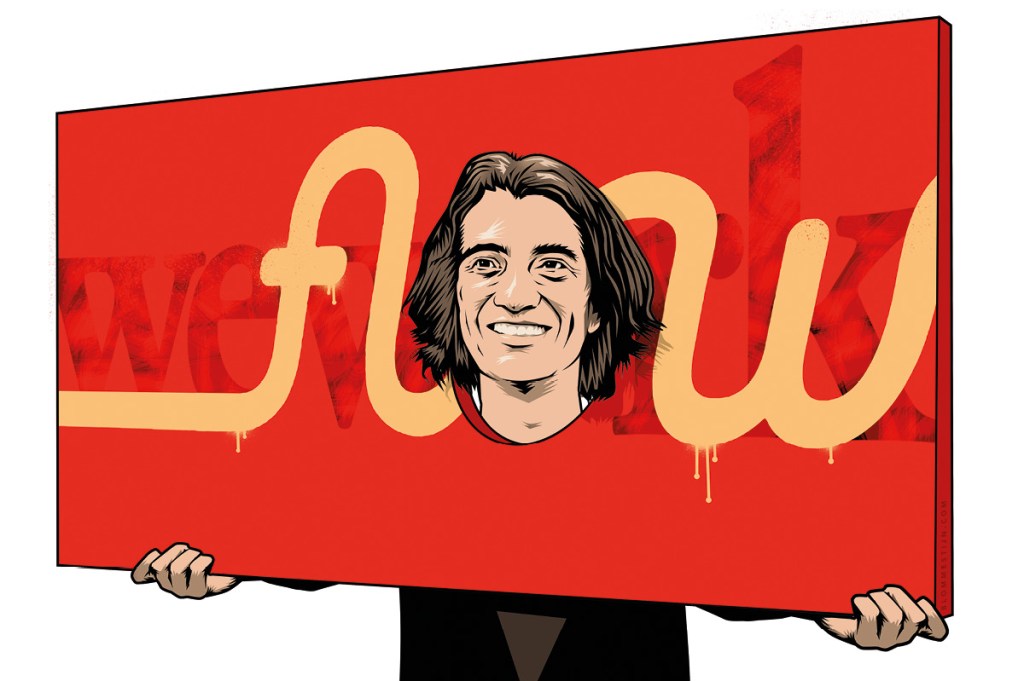Imagine for a moment you are Adam Neumann, the slick, smooth-talking Israeli-born entrepreneur who took the world by storm thirteen years ago with WeWork, his ultimately failed effort to rethink the way we office. After your start up took a tumble and your IPO failed, you nonetheless walk away with roughly $600 million in cash, plus another $400 million loan, and a new lease on life. You head underground, lick your wounds and claim to be trying to learn from what went wrong, including the relentless overhyping, the mismanagement and the enormous losses that your investors suffered. When you re-emerge, you decide to start again and persuade one of Silicon Valley’s most respected investors to back you. Whoa.
For those who somehow missed this drama, or who didn’t watch Apple TV+’s mini-series, WeCrashed, Neumann founded WeWork in 2010 in the tony Soho neighborhood of Manhattan. His plan was to revolutionize the way people worked. Born on a kibbutz, the tall, lithe Neumann was a flamboyant and hypnotic salesman, intent, it seems, on overpromising and underdelivering. He succeeded wildly at that. He was the kind of guy, according to the New York Times, who would, after a few beers, haul several colleagues up to the fifty-seventh floor of the Woolworth Building, in lower Manhattan, to show off the company’s newly acquired co-working space in the prestigious building, and then have them all toss empty bottles into the elevator shaft, go out onto an unprotected ledge, and ask them to drink some fetid liquid found in another bottle. This sort of bizarre loyalty test was just one example of Neumann’s strange management style.
In spite — or perhaps because — of Neumann’s eccentricities, WeWork was, for a while, a Wall Street sensation. It attracted big-name investors, such as Softbank, Goldman Sachs and T. Rowe Price, at ever-increasing valuations. Prior to its expected IPO, in September 2019, WeWork was valued at $47 billion. But WeWork’s IPO registration statement, filed with the Securities and Exchange Commission, raised numerous red flags. The IPO was canceled and Neumann was fired. Softbank took control of the company. Neumann negotiated an incredible settlement, effectively selling his stock in WeWork to Softbank.
Neumann departed with minimal fuss because, according to NYU business school professor Scott Galloway, Softbank’s Masayoshi Son “wanted to save face.” Had Softbank tried to hold Neumann responsible, Galloway says, it would have to explain what went wrong while it had seats on the board,which was something the WeWork board of directors could not do. He adds, “I think Adam Neumann played this perfectly” and that his “singular accomplishment… was getting a 10 percent commission on losing $13 billion. No one’s ever pulled that off.”
In October 2021, WeWork merged with a special-purpose acquisition company, or SPAC, at a headline valuation of $9 billion. These days, following a comprehensive debt restructuring in March, WeWork is valued at around $550 million, down some 99 percent from its peak valuation. You’d think that would have been the end of Adam Neumann, a flash in the pan, best forgotten. But you’d be wrong, proving that, as Galloway observes, “America is the land of second chances, which is an extraordinary thing, right?”
A few months after Neumann left WeWork, in early 2020, he got a call out of the blue from Marc Andreessen, the haughty Silicon Valley venture capital behemoth and the self-proclaimed Smartest Guy in the Room. “And maybe you wouldn’t be surprised,” Neumann explained, when he recounted the story recently at a private Washington conference, “but the phone is not ringing as much as it used to be just a few months before.” Andreessen, Silicon Valley royalty, said he was just touching base with Neumann in exile, or so it seemed. They had never met before. Andreessen’s VC firm Andreessen Horowitz, or a16z, had not been an investor in WeWork. Instead, it had made its reputation investing in the early rounds of such companies as Facebook, Airbnb, Lyft and Stripe.
They were just making small talk on their phone call when Andreessen asked Neumann how he was doing now that he was no longer the toast of the town. Neumann blithered out a response.
“Oh, you’re still in that stage,” Andreessen said.
“What stage is that?” Neumann replied.
“The stage where you believe everything the media says,” Andreessen said.
Neumann denied that’s where he was exactly, but admitted he was still down. “I know we built a great company,” he told Andreessen. “And of course I don’t believe, but, you know, they’re saying quite a lot of things.”
Now that Andreessen had Neumann baited and hooked — vulnerable and doubting himself — he reeled him in. “I know we don’t know each other,” Andreessen said, starting his spiel. “But let me tell you something about venture capital in high-growth companies. The bigger the venture, the bigger the growth. What I’m about to tell you is more true: it’s hand-to-hand combat. Anybody who doesn’t know that venture is hand-to-hand combat doesn’t actually understand it or has never done it before. And when you fight, once in a while you get punched… I guarantee you that for every mistake you made, there’s a hundred things that you did right. And I just want you to know that it’s part of the game to get punched. And the question is not ‘Are you going to get back in the game?’ The question is, when? And just so you know, you have a friend here that you’ve never met before but we’ve been tracking you and if you ever decide to do anything, then call us.”
Andreessen, it seemed, was offering to single-handedly resurrect Neumann from the dead. Neumann hung up the phone and told his wife, Rebekah, who also had a major role in the WeWork fiasco, that he had just had “the most amazing call” with Marc Andreessen, “who basically was very encouraging” and gave him “a new perspective to look at what just occurred.” The Neumanns had one word for Andreessen’s encouragement: “Amazing.”
By that time, seemingly in the clear after the WeWork fiasco, Neumann did what many newly minted demi-billionaires do and opened a family office. He invested in about fifty venture capital and private-equity deals. He did what he called “liquid market trading,” which is what you and I call investing in the stock and bond markets. “And each one of those things taught me something new that I wasn’t aware of before,” he said at the Washington conference. He learned about Wall Street, the public markets, earnings calls, research analysts. He got a new perspective. He found that he enjoyed taking chances on entrepreneurs. “When you invest and write the check it’s a lot of fun,” he said. “But then comes the part where you’re talking to them and listening, and they have problems and I’ve got to give advice to these entrepreneurs. And they didn’t always listen. And I was like, ‘OK, that’s how it feels when an entrepreneur doesn’t listen’ and I was like, ‘OK, I got that’ and that taught me a lot.”
In March 2020, Neumann started buying residential multifamily apartment buildings. He bought some 4,000 apartments in cities such as Miami, Fort Lauderdale, Nashville and Atlanta. “It was a simple trade,” he said, based on where he thought cap rates and interest rates were heading, nothing more. But when he started walking around the buildings he had bought, he started to think, “there was something more that [could] be done” and that “the residential experience is not what it should be.”
That was when Neumann started building what he would later call Flow, a company that would try to do for rent-paying apartment dwellers what he told everyone WeWork would do for office workers: rethink the whole experience, make apartment living more of a fulfilling community and somehow give renters a slice of the equity pie. Instead of just throwing money down the drain in rent payments every month, they would get something closer to home ownership. He had data that showed him that some 70 percent of Americans thirty-five or younger are renters, with that number only increasing, and they are paying about one-third of their monthly incomes on the rent. “And yet they’re not getting an experience that is actually up to par,” Neumann explained. “And they’re not creating any equity. When you put those two things together, you see a real challenge.” Flow was born. It, and its ilk, already have a catchy acronym: “PropTech.” Uh-oh.
Soon enough, Andreessen called Neumann again: “What’s up?” Neumann answered that he was building Flow, working on the brand and the technology platform. Andreessen asked Neumann to present the Flow story to his a16z partners. Andreessen shared Neumann’s belief that the pandemic had probably changed how we live and how we work forever. In other words, Andreessen thought Neumann was on to something. During Neumann’s presentation at a16z, one of Andreessen’s partners asked the obvious question of whether Flow was going to raise outside capital. “I’m not sure,” Neumann told the venture capitalists. “We’re going to build this one on our own. I’m not sure because one of our lessons [from WeWork] was you’ve got to choose your partners really carefully.”
Of course, as Neumann had no doubt learned over the years, the one thing Silicon Valley types hate to be told is that you don’t need their money when they want to give it to you. That’s catnip. A16z immediately urged Neumann to consider the firm as a potential investor in Flow. Neumann allowed a16z to dig into the company, to ask a lot of questions about the business and to study its financials. As time went by and Neumann learned more about a16z, he realized, “These are the kinds of partners that I was always looking for, but never really knew existed.”
Last August, a16z invested $350 million of equity in Flow, at a valuation in excess of $1 billion. It was the largest single investment in the firm’s history, for a startup, no less, and to a man who had already screwed the likes of Masayoshi Son at Softbank, Goldman Sachs and the Harvard Management Company, among others, out of billions of dollars in the WeWork debacle. Andreessen didn’t care.
Somehow, Neumann had romanced Andreessen and his partners about the virtues of Flow, which was still a year from becoming operational. And not with a measly few million dollars but with its largest investment ever. It was a time before the collapse of Silicon Valley Bank changed the gestalt of Silicon Valley, when trees, apparently, could still grow to the sky. “Adam is a visionary leader who revolutionized the second largest asset class in the world — commercial real estate — by bringing community and brand to an industry in which neither existed before,” Andreessen gushed in a blog post, without the slightest acknowledgment of the vast amount of money investors had lost with him. “Adam, and the story of WeWork, have been exhaustively chronicled, analyzed and fictionalized — sometimes accurately. For all the energy put into covering the story, it’s often underappreciated that only one person has fundamentally redesigned the office experience and led a paradigm-changing global company in the process: Adam Neumann.”
The news stunned Wall Street. How could Andreessen, the genius behind the internet browser and countless other brilliant investments, possibly be backing him with the largest single investment in his firm’s fourteen-year history? Aside from the pabulum-filled blog post, Andreessen wasn’t talking. He is not the type to explain himself or to give interviews to the press, which he basically disdains. (He blocks a lot of journalists on Twitter, including me. And a16z’s communications director, Kim Milosevich, did not respond to my requests for an interview with Andreessen.) Neumann wasn’t talking either. Flow’s website is only a placeholder, informing people that the company will be “coming in 2023” and listing job openings for a variety of engineers and a data scientist. But last November, behind closed doors, Neumann, Andreessen and another a16z partner, David Ulevitch, discussed Flow at a16z’s American Dynamism Summit, in Washington, DC (an event designed to “build a bridge between companies, policymakers and government buyers,” according to its own hype.) For unknown reasons, a16z suddenly decided, in February, to release a video of their conversation, sharing the new tale Neumann was spinning, much to Andreessen’s delight.
In it, Neumann explained how Flow was trying to replicate for apartment living the same level of excitement he had attempted to create for an office with WeWork. “That same [sense of] serendipity that you feel when you go in[to] an office and connect, this belongs in the home in a fun way — way more than it ever belonged in an office,” Neumann explained. He said that it was “a little sad” to get a tour of an apartment complex, with its vast array of amenities “and you never see anyone there.” He said that in Israel “there was no such thing as you didn’t know your neighbors.” You’d borrow sugar, you’d borrow soap. You’d go into your neighbor’s home even if they weren’t there. He said living anonymously among others was “an American thing” he was trying to change with Flow. He said when he came to the United States and talked to people in the elevator, they thought he was psycho. “People thought I was weird,” he said. “And I thought it was weird that you wouldn’t say hello. Wouldn’t you want to know who is living there?” He wanted the rental agents in Flow buildings not only to show prospective renters the amenities but also to introduce them to some of the neighbors.
Neumann was convinced that home was the new office, an idea reinforced, or perhaps inspired, by the pandemic. And that there was no longer the need for what he once promised with WeWork but rather that some sort of “hybrid” model that combined home and office could be created in his multifamily rental apartment buildings. “It makes a lot more sense for me, by the way, to meet my wife or my husband in the apartment building when I [go] downstairs to the pool than [it does to meet] in the office,” he said. “And from a business point of view, I can do business there also. And then maybe there should be a co-working space… If culture is not going to be in the office anymore, then maybe there’s a new hybrid that has to do with the home put together with an office space.”
Andreessen was buying whatever it was Neumann was selling. “There’s this moment in time that we’re in right now, like we can actually rethink and reinvent how companies are organized, and how work happens,” he said at the conference. “And then we can also reinvent how people live and give people a lot more options about how that happens. I think basically the presumptions that underlie the whole structure of how the housing market works, and how the industry works, and how people live and work, I think it’s basically all up for grabs.” He said that the pandemic “detonated” the old model of creating a work campus, such as Google and Facebook built in Silicon Valley, with all sorts of perks, such as gourmet meals and dry cleaning, because suddenly people found themselves stuck in their apartments, alone, working all the time, sitting in front of their computers. “I think the idea of sitting in an apartment in front of the screen with DoorDash and Tinder is not a good life,” he said. “And so that that opens the door for reinvention.”
Ulevitch asked Neumann to explain further about his vision for Flow. “We want to create an elevated experience for the resident,” Neumann said. “And we want to find a way to share with the resident a portion of the value that they create. I’ll give that a moment.” He paused. He didn’t think it would be easy to do but said he thought the bar was low. (He’s right about that.) He then started in on the famous Neumann word salad: “You just make a little more connections,” he continued. “You just make it a little bit more real. You pay attention to the people running it. You maintain it the right way. You leverage technology to actually make things work.”
Neumann talked about Flow’s “four pillars.” One pillar is the “branded technology” management company that runs the apartment complexes. Another is the real-estate company that owns the buildings. (He emphasized that Flow and a16z were already perfectly “aligned” in that they had each contributed to their partnership an equal amount of value, suggesting that Neumann’s buildings were also worth $350 million.) The third pillar of Flow was a — dreaded — financial services company: you know since renters are forking over a third of their paycheck to Flow anyway, Flow might as well offer them financial services, too.
The fourth pillar was the “mechanism” whereby Neumann figured out how to “take some of this value and share it with the value creators.” He said he thought it would be “soul-crushing” to pay rent for twenty years or so and not have anything to show for it. Flow, he claimed, would somehow change that calculus. Having rent payments alchemize into equity ownership would truly revolutionize the rental experience. Solving that problem was “more complicated,” he conceded, but “that’s the vision.”
He never said, though, how paying rent would turn into an equity ownership position. (That’s because, says Scott Galloway, the only way to do it would be to raise rents considerably and apply some of the higher rent to pay down the apartment complex’s mortgage.) He did explain, though, how it would benefit him, Flow and a16z. He called it a “flywheel,” one of Silicon Valley’s favorite buzz words these days. “If we can actually create a better experience in the building,” he said, “then the building performs better and makes a higher NOI” — net operating income — “and if the building makes a higher NOI, then we’ll be able to raise more money and buy more buildings. If we buy more buildings, then we’ll be able to run more buildings and have more users in those buildings. And those users are going to start using our financial services” — what he called “financial wellness” — “then that again is going to drive more users.” Déjà-vu all over again?
He continued talking in platitudes. “If we are able to take this value-creating mechanism and share it with the residents, a portion of the value is going to make them feel ownership,” he said. “And it’s not just ownership — ‘I feel like I’m part of something’ — it’s ‘I actually own part of something.’” Neumann tried to explain what he meant but without explaining how it would work. “If there’s perceived value, if that value appreciates over time, then I feel like I’m part of a community.”
That “vision” was somehow enough to get Andreessen to pony up $350 million, at a valuation in excess of $1 billion. But, at the moment anyway, it’s a vision that sounds like little more than a partnership that owns some apartment buildings. Of course, Neumann is right, but he has fallen way short of explaining how renters at his buildings would generate equity value in exchange for their rent payments. And, of course, he’s not made himself available to discuss how Flow might do that. Instead, he’s back to spinning, just like he did in the good old days. “The housing crisis that we describe might be one of the biggest challenges that the US is facing today,” Neumann said at the a16z conference. He said he agreed with Andreessen that the two partners — Flow and a16z — have about five years of runway to do something “really big” to change the industry. “All I can tell you is I think we have the right team to give it a shot,” he said
It might not be surprising to see Neumann attempt a comeback. What is harder to fathom, though, is why Andreessen is betting so heavily on the idea that somehow this time there will be a different Adam Neumann. “There’s something a little strange about this being essentially an investment in an individual’s ability to craft a narrative that attracts capital, with no evidence that he can actually build anything resembling enduring value,” says Galloway, adding that while WeWork was in the process of imploding, the company was losing around $100 million a week. “He was flying the equivalent of two Bombardier Global Expresses into a mountain every week,” he continues. Galloway adds that he’s rather stunned that Andreessen would put so much money behind a failed entrepreneur. “The investment committee there has their face hermetically sealed to a crack pipe to decide for reputational reasons to engage with this guy,” he concluded. “It’s just dumb.”
Adam Neumann is somehow back in the game, guilelessly trying again to change the way we live and work. Only in America.
This article has been amended to make clear that it is not suggested that Adam Neumann deliberately misled investors or broke the law in any way.
This article was originally published in The Spectator’s May 2023 World edition.

























